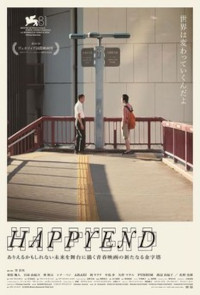| SHADOWS ON THE WALL | REVIEWS | NEWS | FESTIVAL | AWARDS | Q&A | ABOUT | TALKBACK | |||||||||||||||||||||
 Shadows off the beaten path Shadows off the beaten pathIndies, foreign, docs and shorts...
On this page:
GHOST TRAIL |
HAPPYEND |
TAPE
| |||||||||||||||||||||
| See also: SHADOWS FILM FESTIVAL | Last update 14.Sep.25 | |||||||||||||||||||||
|
Ghost Trail Les Fantômes Review by Rich Cline | 
| |||||||||||||||||||||
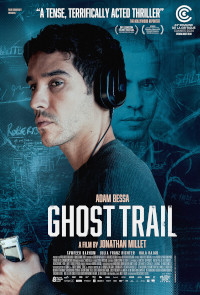 dir Jonathan Millet prd Pauline Seigland scr Jonathan Millet, Florence Rochat with Adam Bessa, Tawfeek Barhom, Julia Franz Richter, Hala Rajab, Shafiqa El Till, Sylvain Samson, Mohammad Saboor Rasooli, Faisal Alia, Pascal Cervo, Mudar Ramadan, Dorado Jadiba, Fakher Aldeen Fayad release Fr 3.Jul.24, US 30.May.25, UK 19.Sep.25 24/France 1h47 CANNES FILM FEST  Is it streaming? |
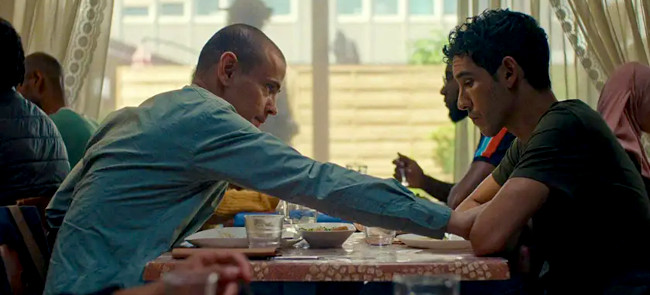 Based on real events, this dramatic thriller opens in 2014 as badly tortured prisoners are released into the Syrian desert, where they're expected to die. This beautifully informs the quietly intense story that follows, anchored by another charismatic turn from Adam Bessa (see Harka). Filmmaker Jonathan Millet expertly keeps the narrative locked on this central character, digging under the surface to touch on wider themes and deep emotions. Having survived and settled in Germany, then moving to France, Syrian refugee Hamid (Bessa) is working various jobs in Strasbourg while searching for his cousin. Syrian care worker Yara (Rajab) offers to help, and he's happy to make a new friend from his homeland. But Hamid is actually working with a secret group hunting war criminals, and the man he is stalking isn't his cousin. He's former prison guard Harfaz (Barhom), who brutally tortured inmates including Hamid. Tracking him brings up trauma Hamid has tried to forget. And when they speak, Harfaz doesn't recognise him. Knowing details bring this story to vivid life, such as how Hamid's group communicates in an online chatroom while playing violent war videogames, he also has brief meetings in a park with his contact Nina (Richter), who has her own agenda. Others are concerned that he refuses to return to Germany, doubting that he has found the notorious Harfaz. They also hint at Hamid's previous mental issues. The narrative quietly squeezes all of this together as the story tightens, leading to a grim moral dilemma. Holding the screen with thoughtful intensity, Bessa brings likeable intelligence to Hamid, a former literature professor who lost his wife and daughter in a bombing. He has regular FaceTime calls with his mother (El Till), who fled to a refugee camp in Lebanon. Her health issues weigh heavily on his mind. Most of his conversations are whispered and tense, so his offhanded interaction with the magnetic Barhom's Harfaz carries a proper kick as it traces the situation on a larger scale with underlying textures. There's a steady stream of references to personal experiences from the Syrians conflict, including horrific prison treatment and the day-to-day issues faced by exiles. These things are neither exaggerated nor used for shock value, as it were; they layer in unexpected emotional resonance. Harfaz says you can't start anew if you dwell on the past, but Hamid understands that it's impossible to move forward without confronting the darkness. And larger questions about justice hover throughout the film in visceral, haunting ways.
| ||||||||||||||||||||
|
Happyend Review by Rich Cline | 
VENICE FILM FEST TORONTO FILM FEST  Is it streaming?
| 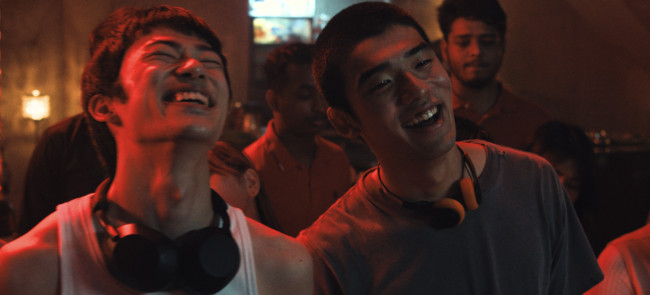 Set in a near-future Japan, this drama follows lively teens straining against a system that is trying to control them. Writer-director Neo Sora assembles this in a loose style that generally avoids a driving narrative, instead zeroing in on details to create an intriguing slice-of-life approach. These teenagers behave realistically as they interact, revel in their music and begin to discover what's happening in the world around them. As graduation approaches, Yuta (Kurihara) and his best pal Kou (Hidaka) are getting up to all kinds of mischief with their pals Tomu (Arazi), Ming (Peng) and Ata-chan (Hayashi). They particularly love hanging out in their music room creating smooth beats. But when a spectacular school prank targets the principal (Sano), he labels it an act of terrorism, and installs an intense security system that recognises students and assigns punitive points for any infraction of his rules. Of course the kids rebel against this, echoing protests in the streets against the increasingly dictatorial prime minister. Seen through the teens' perspective, everything is infused with relaxed humour, carefree rebellion and casual resistance to any kind of control. A hilarious streak of comedy running through most scenes, even as darker themes emerge. Intriguingly, this is an integrated school in which about a third of the graduating class are not Japanese citizens, and this is becoming more of an issue with a racist government in power. Meanwhile, everyone is afraid that a big earthquake is overdue. The actors evoke adolescent exuberance and strong camaraderie. Kurihara and Hidaka create an unusual physical, verbal and emotional shorthand to vividly depict the life-long friendship between Yuta and Kuo. It's riveting to watch, and it extends to their classmates, especially when they unite to take a stand, even though some don't believe it will change anything. So while the film feels like it is infused with youthful optimism, there is actually something much more provocative going on here. At the centre is the fact that Kuo, who works in his family's cafe and has lived here his whole life, is not Japanese. So Kuo is regularly harassed by police, and Yota understands that he needs to help however he can. Other friends have similar issues regarding nationality, financial stability and security, and all are at risk due to crackdowns both at school and across the nation. These ideas are gently woven through the narrative, creating an engaging atmosphere while also nudging us to think about the truth.
|
| Tape Review by Rich Cline | 
| 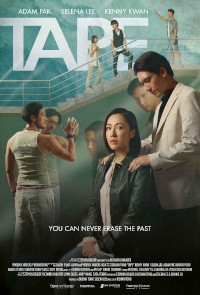 dir Bizhan Tong prd Bizhan Tong, Selena Lee scr Stephen Belber, Bizhan Tong, Selena Lee, Bonnie Lo with Kenny Kwan, Adam Pak, Selena Lee, Mason Fung, Angus Yeung, Summer Chan release UK 19.Sep.25 24/China 1h50  See also:  Is it streaming?
| 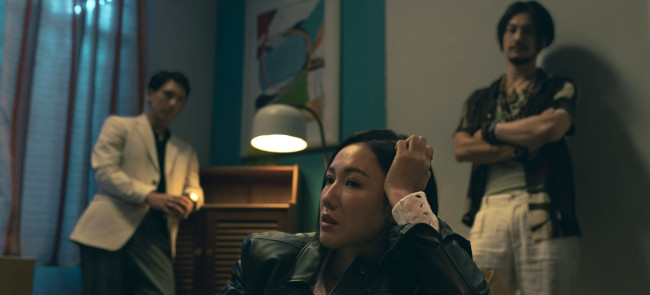 A Hong Kong remake of Richard Linklater's superb 2001 film, with Stephen Belber again adapting his play, this is essentially an extended conversation between three old friends in a single location. It twists and turns as the power dynamic shifts between them. What emerges is a heart-stopping exploration of perspective and memory that gets increasingly intense. This is a smart and powerfully unsettling exploration of an urgent issue. Before his long-time friend Chong (Kwan) arrives at his studio flat, Wing (Pak) secretly sets up a video cameras to record their meeting. A successful arthouse filmmaker, Chong now goes by Jon and has a wife and children back in Taiwan, while Wing is still a cool-dude party boy who sells drugs for a living. As they catch up, their conversation turns fiery when Wing confronts Jon about hooking up with his ex-girlfriend Amy (Lee) on their high school graduation night. So Wing invites her around, and Amy also has things she needs to say. In a lively 15-years-earlier prolog and epilog, Chong, Wing and Amy (Fung, Yeung and Chan) are teens preparing to leave school, discussing the future while Chong documents them on video. Seeing them today is a witty inversion, as Jon warns Wing that his toxic-male tendencies hold him back personally and professionally. When the tables turn, Wing seizes the upper hand, or maybe he's just being manipulatively invasive. And Amy's side of the story feels eerily irrelevant to how the men feel about it. So she must her point forcefully. Wing and Jon think they have the moral high ground, but both are distinctly transgressive. Pak plays Wing as a man acting the fool, casually disruptive and almost menacing as he quizzes and gloats. Much more contained, Kwan's Jon goes from quietly egotistical to churning desperation and rage, barely holding himself together as truths emerge, pushing him into a corner. As Amy, Lee is more thoughtful, in control of her narrative. All three have trouble discussing these enormously emotive ideas, and their dialog unfolds in such a complex way that our minds are spinning as well. Each of them has various moments to be in charge of what is being said, while the others squirm in their feelings of confusion and humiliation, all hinging on how point of view changes from a teen to a young adult. The quiet cruelty that emerges through their words induces a vivid chill. And where this goes is provocative and important.
| 
See also: SHADOWS FILM FESTIVAL © 2025 by Rich Cline, Shadows
on the Wall
HOME | REVIEWS | NEWS | FESTIVAL | AWARDS
| Q&A | ABOUT | TALKBACK | | ||||||||||||||

